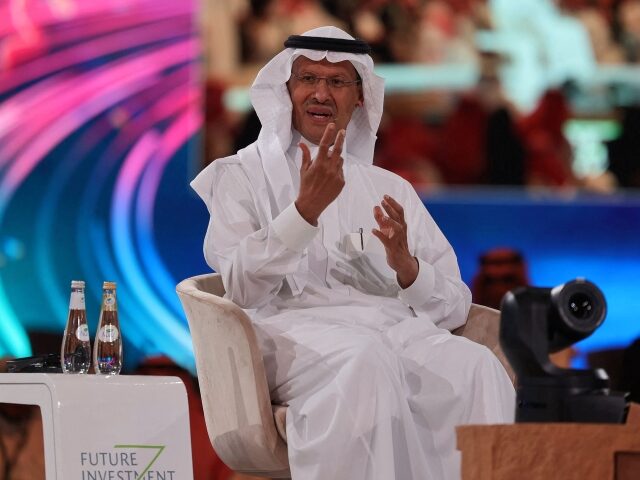Saudi Arabia’s energy minister, Prince Abdulaziz bin Salman, said from the sidelines of the COP27 climate summit in Sharm el-Sheikh, Egypt, on Friday that his country is being heavily targeted by activists for its leading role in oil production.
“The world is hoping to crucify us,” he lamented.
Abdulaziz argued this attitude was unfair because Saudi Arabia has done a good job of controlling emissions, extensively funds renewable energy research, and plans to reach “net zero” emissions by 2060 at the latest.
“We believe that date hopefully can be brought earlier, but I just want to make sure that when we commit we deliver, but our hope is to deliver ahead of time,” he said.
“We want people to match us, and we want to make sure people put their money where their mouths are,” he challenged.
Abdulaziz said Saudi Arabia plans to export hydrogen and electricity, as well as oil and liquid gas. The Saudis are planning a huge hydrogen plant in the Red Sea coastal city-to-be of Neom that could begin producing some 650 tonnes of hydrogen fuel per day as early as 2026.
Abdulaziz said in February that his country intends to become “involved seriously in hydrogen” and become “the most competitive producer” in the world.
Several color-coded varieties of hydrogen fuel are under development. The Saudis have already made investments in three of them: “Green hydrogen” fuel can be made from water, as the Neom plant would do, while “blue hydrogen” is created by splitting molecules in methane gas, and “pink hydrogen” is created through electrolysis and nuclear power.
The Financial Times somewhat skeptically noted that hydrogen fuel cells remain a much-anticipated but unproven technology, and “green hydrogen” can be manufactured almost anywhere that has an abundant supply of water and electricity, so if demand materializes there will be competition from many other producers, including Russia, the United Arab Emirates (UAE), and especially Oman, which has been touting big plans for hydrogen development.
The Saudis might be able to develop a substantial lead in blue hydrogen, which is not as “clean” as the other varieties but is about one-fifth as expensive to manufacture.
“We will have a field day with blue hydrogen because again, we’re the cheapest cost producer of gas. We’re doing a huge investment in shale gas in Saudi Arabia, and we will be dedicated to have that gas to be used for producing blue hydrogen,” Abdulaziz explained in October 2021.
“If we produce the blue hydrogen we will be the lowest cost producer and if we go for green hydrogen, we will still be the low cost producer,” he predicted on Friday at COP27.
On Thursday, Saudi Arabia’s national oil company Aramco signed a joint agreement with multinational corporations SLB and Linde to build a massive “carbon capture” hub in the eastern city of Jubail. The facility is expected to store up to 9 million tonnes of carbon dioxide a year when it becomes operational in 2027, raising Saudi Arabia’s total storage capacity to 44 million tonnes.
Carbon capture technology extracts carbon – allegedly one of the primary contributors to climate change – from fossil fuel burning and industrial activity. The carbon is then compressed, transported to a storage site, and either pumped deep into the earth for disposal as though it were buried toxic waste or stored more conveniently for use in future industrial operations. With further technological developments, captured carbon might be used to create hydrogen fuel.
Carbon capture is one of the sore points between the energy industry and climate activists that probably inspired the Saudi energy minister to make his “world wants to crucify us” comment. Industrialists want credit for investing billions in technology that decarbonizes the atmosphere, while activists accuse the energy industry of using capture facilities as fig leaves to cover increased carbon production and worry about the risk of leaks from storage facilities.
The dynamics of this argument could shift if the technology to use captured carbon for producing hydrogen fuel is developed, especially if such procedures reduce the cost of hydrogen enough to make it competitive with fossil fuels.
The Saudis are at the forefront of arguing that fossil fuels produced with the cleanest possible methods are the only way to provide the energy needed by industrialized nations until technologies like hydrogen power can be perfected and made competitive.
Saudi Aramco chief executive Amin Nasser on Friday argued environmentalists made a mistake by agitating against needed investments in fossil fuel supply, causing shortages, price spikes, widespread inflation, and a surge of pent-up demand that is driving heavy expansion of the very industries the climate change movement wants to regulate out of existence.
“You need to invest to decarbonize existing resources, like oil and gas, while building your renewable sectors. That needs to happen in parallel,” Nasser said.

COMMENTS
Please let us know if you're having issues with commenting.